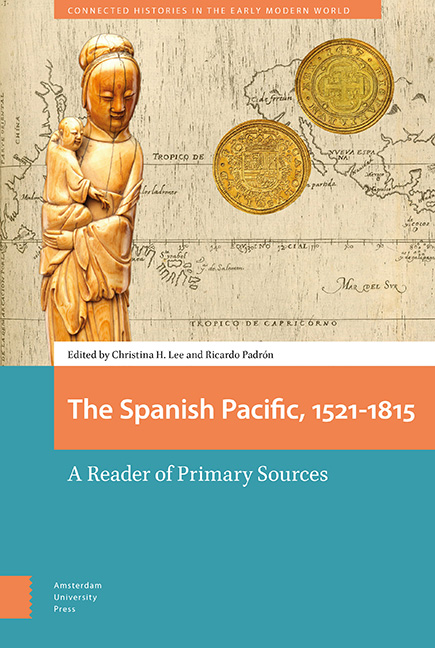Book contents
- Frontmatter
- Contents
- Abbreviations
- Acknowledgements
- Introduction
- 1 An Early Transpacific Account of the Spice Islands by Andrés de Urdaneta (1536)
- 2 Domingo de Salazar’s Letter to the King of Spain in Defense of the Indians and the Chinese of the Philippine Islands (1582)
- 3 Juan Cobo’s Map of the Pacific World (1593)
- 4 A Royal Decree of Philip III Regulating Trade between the Philippines and New Spain (1604)
- 5 Manila’s Sangleys and a Chinese Wedding (1625)
- 6 Don Luis Castilla Offers to Sell Land in Manila (1629)
- 7 Idolatry and Apostasy in the 1633 Jesuit Annual Letter
- 8 The Will of an Indian Oriental and her Chinos in Peru (1644
- 9 Francisco de Combés’s History of Mindanao and Jolo (1667)
- 10 Between Fiction and History in the Spanish Pacific The Misfortunes of Alonso Ramírez (1690)
- 11 A Moluccan Crypto-Muslim before the Transpacific Inquisition (1623–1645)
- 12 Constitutions and Rules of the Beatas Indias (1726)
- 13 The Poetics of Praise and the Demands of Confession in the Early Spanish Philippines: Notes and Documents
- 14 The Pacific Theater of the Seven Years’ War in a Latin Poem by an Indigenous Priest, Bartolomé Saguinsín (1766)
- 15 A Prohibition on Digging Up the Bones of the Dead (1813)
- Index
1 - An Early Transpacific Account of the Spice Islands by Andrés de Urdaneta (1536)
Published online by Cambridge University Press: 20 November 2020
- Frontmatter
- Contents
- Abbreviations
- Acknowledgements
- Introduction
- 1 An Early Transpacific Account of the Spice Islands by Andrés de Urdaneta (1536)
- 2 Domingo de Salazar’s Letter to the King of Spain in Defense of the Indians and the Chinese of the Philippine Islands (1582)
- 3 Juan Cobo’s Map of the Pacific World (1593)
- 4 A Royal Decree of Philip III Regulating Trade between the Philippines and New Spain (1604)
- 5 Manila’s Sangleys and a Chinese Wedding (1625)
- 6 Don Luis Castilla Offers to Sell Land in Manila (1629)
- 7 Idolatry and Apostasy in the 1633 Jesuit Annual Letter
- 8 The Will of an Indian Oriental and her Chinos in Peru (1644
- 9 Francisco de Combés’s History of Mindanao and Jolo (1667)
- 10 Between Fiction and History in the Spanish Pacific The Misfortunes of Alonso Ramírez (1690)
- 11 A Moluccan Crypto-Muslim before the Transpacific Inquisition (1623–1645)
- 12 Constitutions and Rules of the Beatas Indias (1726)
- 13 The Poetics of Praise and the Demands of Confession in the Early Spanish Philippines: Notes and Documents
- 14 The Pacific Theater of the Seven Years’ War in a Latin Poem by an Indigenous Priest, Bartolomé Saguinsín (1766)
- 15 A Prohibition on Digging Up the Bones of the Dead (1813)
- Index
Summary
Abstract
Andrés de Urdaneta (1508?–1568) tells the story of the ill-fated expedition of Jofre García de Loaysa (1490–1526), which was meant to consolidate the Spanish claim to the Spice Islands in the aftermath of the Magellan expedition. Urdaneta, a participant in the expedition who later made important contributions to Pacific navigation, covers the ill-fated voyage of Loaysa's fleet as well as the armed conflict that ensued when the Spanish arrived in the Moluccas only to find the Portuguese already ensconced on the island of Ternate. This brief narrative provides an insight into a complex political and military situation, in which the rivalry between the two Iberian empires overlaps with the local rivalries of sixteenth-century insular Southeast Asia. Jorge Mojarro provides the necessary historical context.
Keywords: Pacific exploration; Moluccas war; military transculturation; Hispano-Portuguese rivalry
The arrival of the ship (or nao) Victoria, in Sanlúcar—loaded with spices— in September 1522 seemed to promise great profits to the emperor as well as to the creditors who risked sponsoring the successive overseas expeditions. The doors had been opened for Spain to reach the Moluccas through the Strait of Magellan, an unacceptable situation to the new king of Portugal, João III, who claimed that the Spice Islands were within its demarcation. The Portuguese king agreed with Carlos V that expert navigators and geographers of both nations would hold a meeting in 1524, known as la Junta de Badajoz y Elvas (Board of Badajoz and Elvas), which ended after two months of discussions without any agreement. This temporary limbo in geographical knowledge served the Spanish Crown as a legal subterfuge to organize another expedition. This time, a larger and better equipped crew was under the command of García Jofre de Loaysa (1490–1526). It would leave from the port in La Coruña, where the central trading agency for the Spice Islands—the Casa de Contratación—was founded in July 1525.
Loaysa's expedition, which was unknown to almost everyone except navigation historians, is one of the most fascinating and tragic adventures ever narrated despite its failure to achieve its objectives.
- Type
- Chapter
- Information
- Spanish Pacific, 1521–1815A Reader of Primary Sources, pp. 21 - 36Publisher: Amsterdam University PressPrint publication year: 2020



